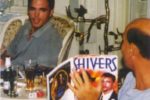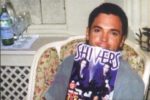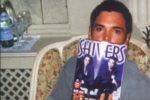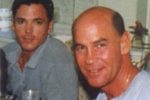Oct-28-1996
Cinefantastique
Darin Morgan
Paula Vitaris
The X-Files’ court Jester on Turning the Show Inside-Out
There’s a scene in the X-Files episode “Jose Chung’s ‘From Outer Space”‘ wherein a teenage girl wakes up after a possible alien abduction to find she is wearing her clothes inside out or backwards. “Inside out or backwards” also serves as a fitting description for the comic X-Files episodes written by Darin Morgan, author of “Jose Chung’s ‘From Outer Space”‘ and three others: “Clyde Bruckman”s Final Repose,” “The War of the Coprophages,” and last season’s “Humbug.” Morgan’s episodes are all bonafide X-files, with cases to be solved and creepy monsters and aliens on the prowl, but like any good court jester, he has no hesitation in sticking a pin into the inflated balloon of X- files convention, be it Mulder’s reputation as a well-dressed genius, Scully’s ultra-professionalism, or the show’s thoroughly serious tone. The person behind all the hoopla is a self-effacing 30-year-old man with a love for the work of Buster Keaton, Charlie Chaplin, Harold Lloyd, Howard Hawks, Preston Sturges, and Billy Wilder. The younger brother of X-Files producer-writer Glen Morgan, he was offered two jobs during the X-Files’ second season: to play the mutant Flukeman in “The Host” and to help work out the story for the “Blood” with Glen and James Wong. Morgan’s work on “Blood” earned him a spot on the writing staff, which he accepted even though he was unsure of his ability to turn out a script due to his slowness as a writer and his natural bent towards comedy. When he finally turned in “Humbug,” the staff and the network were understandably apprehensive, since the episode was so unlike anything done before. Even though “Humbug,” his first produced script, turned out to be massive hit with the fans, to this day he is unsatisfied with the final result, lamenting the loss of a number of good gags. Morgan got the feeling he was on the wrong show. No matter how much he tried to be serious, he kept turning out funny stuff. “At least on The X-Files, there always was a point to why I was being funny. I tie it into the show in various ways,” he said. “The thing I was always careful of was to make sure I had a real investigation, with theories from both Mulder and Scully. I was aware I was doing things differently, but I also wanted to make sure I was doing all the things the show would normally do. In ‘Clyde Bruckman’s Final Repose,’ each time Mulder says Clyde is psychic, Scully had a legitimate reason to say he’s not. I did even more in ‘Coprophages,’ where, in the end, Scully was wrong, but she was right in the beginning, and that’s what the whole show is about: different theories, how to explain certain phenomenon. My scripts had that, and I always had stereotypical ‘boo’ scenes or act-outs [ending an act] with a dead body. I was proudest of ‘ Jose Chung,’ in which only two people died, and I didn’t have a death on an act-out. You get in the habit of saying. ‘Okay, here’s a dead body,’ cut to commercial. But you usually have to have those. The X-Files is a kind of horror show, so you have to have those moments of genuine terror or grossness. ”
His lingering disappointment with “Humbug” took him in another direction, a story that would become his second episode, “Clyde Bruckman’s Final Repose,” about a weary middle-aged insurance salesman with the ability to see people’s deaths. When Mulder and Scully ask his help to help solve a series of murders of fortune tellers, Clyde, played by Peter Boyle, is reluctant. To his mind, there is no altering the future. “I felt I had done ‘Humbug’ wrong, so I watched ‘Beyond the Sea” [Morgan’s favorite X-Files episode] again to see what the show is really about. I decided to try to write one that was much more serious and much more depressing. I really was trying to write a show with no jokes in it at all–but I failed.” The character of Clyde Bruckman was named for a comedy writer and director who had committed suicide in 1955. “I was so depressed after ‘Humbug’ that I felt suicidal,” he recalled. “So I said, ‘I’m going to write about a character who will commit suicide at the end.’ You hear these things about people’s careers going downhill, and Clyde Bruckman always struck me as being the ultimate Hollywood horror story. He worked with Keaton, Lloyd, Laurel and Hardy, and W.C. Fields. There was a ten year span that must have been the greatest. I can’t think of a greater series of jobs. Yet the guy obviously had some problems. He was an alcoholic, and ending up killing himself.”
Another source of inspiration came from Morgan’s insurance salesman father who is, said Morgan, “kind of a depressive guy,” like the fictional Clyde. Morgan was also intrigued by the notion of an insurance salesman who can foresee the future. “Insurance is about what will happen to you. You don’t know, so you have to take out insurance, and to have a character who actually does know trying to sell people that was kind of amusing.” The episode’s exploration of free will versus determinism, and coincidence versus fate grew out of Morgan’s difficulties with plotting. “I’ve always been really bad with plot and trying to figure out twists,” he said. “So Clyde Bruckman and the killer character act in ways that were really easy to plot, but which make the story seem complicated. Stu Charno, who played the killer, asked me, ‘Why does the guy kill?’ I told him ‘Because I needed him to.’ He really doesn’t kill for any specific reason. I had come me up with this idea of the killer as a puppet, someone who doesn’t feel in control of his own life. That’s why I like the story so much. It’s so contrived, that if you think there’s a future out there that you can see, you have to assume it was contrived or plotted that way by someone.”
Morgan researched fortune tellers and psychics, learning about their tricks to delude the public. Out of that grew a memorably over-the-top character, “a cross between Uri Geller and the Amazing Kreskin,” according to Morgan — the Stupendous Yappi, played by Jaap Broeker, David Duchovny’s stand-in. “Jaap is such a bizarre character,” Morgan said. “He has a very interesting facial structure, and he’s mesmerizing. I based Yappi’s speech patterns on him. Japp really talks like that, very fast, and sometimes he doesn’t stop.”
The first act opening scene, when Mulder, Scully and Yappi all show up at the scene of the latest murder, is Morgan’s favorite of all his episodes “Even though it was just a series of one-liners, a lot of information was conveyed. It was all done so fast that it seemed to work. Also, the other cops bought into Yappi’s explanation, which separated Mulder and Scully from the other investigators. I like the fact that it was Mulder who was making those points. Even though he believes in psychic phenomenon, he’s smart enough to know the difference between a charlatan and a real psychic.”
Besides Clyde Bruckman, the episode also demonstrates Morgan’s care in delineating Mulder and Scully. “Everyone looks at Mulder as having all the answers, he said, “Most of the other episodes present him as usually right. I’ve always found that the things he talks about, if a normal person talked about them, you’d go, ‘This guy’s crazy.’ He’s supposed to be a smart guy, but I’ve never looked at him as such. He’s just more lucky in some of his explanations. And Scully, although skeptical, has the right approach when she says, ‘I don’t believe this.’ Before I wrote for the show, Mulder always seemed like the more interesting character, but once I started writing for it, I found that I liked Scully more.”
The result is that Morgan often shakes up Mulder’s image, as at the end of “Humbug,” with Mulder unwittingly striking a GQ pose. “I don’t mind making fun of Mulder,” Morgan said. “He’s presented as the seeker of the truth, and to me such people are always somewhat ridiculous.”
Mulder’s and Scully’s attitudes toward Clyde also demonstrate Mulder’s views of their characters. “My pitch to Chris was that Mulder is so involved in psychic phenomenon that he’s interested in Clyde only for his abilities. But Scully, doesn’t believe in these abilities, so she can consider this man as a person and see how, even though he believes he’s psychic, it’s ruined his life. That was one of the main points of the episode. Everyone considers Mulder to be the one who has all the answers, but I think sometimes he’s so narrow-minded that he doesn’t do some things properly. He never really considered Clyde Bruckman as a person only as a phenomenon. The note Clyde leaves for Scully is written to her, because Bruckman knows that she’s treating him as a person.”
“Clyde Bruckman”s Final Repose” contained several lines of dialogue that sent fans into a frenzy pondering their meaning. The first came when Bruckman told Scully she wouldn’t die. “Some people took it to mean that Scully was immortal, but the meaning was that Clyde knows how Scully’s going to die, but he likes her so much he’s not going to tell her, because telling her would ruin her life, whether she believed it or not. Telling someone they’re not going to die is one of the nicest things you can say. That’s why he says it to her. It had nothing to do with whether she was immortal or was going to be hurt in the show.”
The other line of dialogue that transfixed fans came when Bruckman says offhandedly, “I’m sure there are worse ways to go, but I can’t think of a more undignified one than auto-erotic asphyxiation,” and Mulder quickly demands, “Why are you telling me this?” Is it just another joke, or is there some deeper meaning? “Well, yes and no,” Morgan hedged. “I think that’s what Mulder will die of A homicide investigation book I read had several pictures of people who died in that manner. There’s something in those pictures that is so disturbing, in the sense of going back to the ancient Greeks, and their idea of ‘don’t dishonor my body after I die.’ It’s bad enough to be found dead, and suicide is tragic, but then you see these people who have these really complicated, almost Rube Goldberg type set-ups. It would be humorous if it wasn’t so disturbing. This ties in with Clyde’s dream about what your body looks like when it dies. How will it be found? In what condition and what manner? That was the gist of that character. The autoerotic asphyxiation is obviously a joke line, but it came about from studying those photos.”
Third season post-production for Morgan was a much more pleasant experience than it had been with ‘Humbug.’ “On this show, you’re really regarded as being a producer of your own episode,” Morgan said. “No one trusted me on ‘Humbug,’ because it was my first. But on ‘Clyde Bruckman’ and the cockroach episode, it worked out that both David Nutter and Kim Manners had to start prepping another show immediately. They each had one day of cutting and then I was allowed to be in there with the editor.”
“Clyde Bruckman”s Final Repose” won Morgan praise from an unexpected quarter, when the science fiction author Harlan Ellison called to express his admiration. Morgan not a science fiction fan, had no idea who Ellison was. “He was the childhood idol of some of the writers on our staff and they were all pissed off that I didn’t even know who he was, and he called me,” he laughed. “I’ve since learned about him, although I’ve yet to really read his stuff. He really liked the episode and thought Peter Boyle was great.”
‘The War of the Coprophages, ” in contrast to the more measured, meditative “Clyde Bruckman’s Final Repose,” was Morgan’s lightest, fastest, most farcical episode. “There were some serious, actual ideas in this one, so I felt free to be a little bit lighter,” Morgan explained. The episode opens on a weekend with Mulder up in Massachusetts, hanging about UFO hot spots, and Scully at home doing those mundane things everyone does during the weekend. The X-File arrives when Mulder is pulled in by local law enforcement to help solve the mystery behind some strange deaths caused, according to witnesses, by swarms of roaches. Mulder traces the roaches–which he believes, naturally, to be robotic alien probes–to a factory that produces methane from dung.
The episode worked, Morgan feels, but it’s another script with which he is unhappy, although he can’t put his finger on what bothers him. ‘I don’t know!” he laughed. ‘I had less time to do that script than any other one. I wrote it in a week. I was a couple of days late with the last act, the only time I was ever late with a script. Fortunately [ director] Kim Manners really liked it a lot, even with just the first three acts, so no one was mad at me.”
Morgan conceived the idea of alien robot insects from his research into robotics and artificial intelligence. “Everyone assumes that if there are extraterrestrials visiting us, that they would look like gray aliens,” he said. “There is this idea that our own future in space exploration is going to be robotic. It would make sense that other alien forms, if they do visit us, would also be robotic. There is a roboticist at M.I.T., Rodney Brooks, who has devised robots in the forms of giant bugs a foot long. They operated much better than other robots, because he had decided that instead of trying to duplicate the way the human brain works, he would make his robots’ brains work the way an insect brain works, purely on reflex. The other idea in the episode was how we think our brains are so complicated the highest level of evolution, and yet so many of our actions and beliefs and thoughts are dictated solely by reflex responses, much like a cockroach’s. That was the idea behind the mass hysteria: that people don’t think about what’s happening. they just hear something and react, and scurry around like insects.”
The big “scurry around” scene in “The War of the Coprophages” was a hilariously slapstick mini-riot staged in a convenience store where the indefatigable Scully has stopped to buy a road map. Morgan’s source for this scene was the famous 1938 radio adaptation by Orson Welles of H.G. Wells’ War of the Worlds (the X-Files episode is set in Millers’ Grove, Massachusetts, a tribute to the radio show’s Grover’s Mills, N.J.), which Morgan considers a fascinating case of mass hysteria. “Nothing like that has ever happened in my lifetime. War of the Worlds is an example of people reacting by reflexes rather by complex thoughts. I always wonder what I would have done–you always like to think of yourself as being clearheaded. There are so many inconsistencies in the War of the Worlds radio broadcast that if you actually listen to it, it doesn’t make any sense. But I’m sure at the time and the moment, I would have been as terrified as anyone.”
Mulder and Scully prove to be immune from the panic gripping the town, but they have their own unique ways of reacting. “Although Mulder never reacts to the hysteria he has his own mindset, so whenever he hears killer cockroaches, he goes, ‘Oh my God!’ without thinking,” Morgan said. “Scully keeps telling him, ‘Oh no, it’s probably this other thing.’ She’s always right. But because Mulder has his own way of perceiving things, he keeps trying to convince himself that he’s on to something bigger.”
Another memorable character makes her appearance halfway through the episode, Bambi Berenbaum (Bobbie Phillips), possibly the most luscious entomologist on the face of the earth. “I thought it would be amusing if Mulder found another woman partner.” Morgan explained. “All of sudden Scully starts going, ‘No, this isn’t just cockroaches! This is something big! I’m coming up there!’ I thought it was amusing, that she would abandon some of her beliefs in order not to lose Mulder to another woman. We received some letters from people who were displeased that Mulder could find Bambi attractive. On the other hand, she is a very intelligent woman. So I don’t see why people got mad at that, but just the idea of Mulder having an interest in someone other than Scully put people into shock. You kind of forget Mulder is a man, because he’s so interested in the paranormal. But he’s a man, nevertheless, and I thought it would be interesting to have him be attracted to a woman.”
Morgan’s final verdict on “The War of the Coprophages” is resigned: “It’s never boring. It moves really fast. And there’s a certain achievement in centering an episode around cockroaches and dung.”
Morgan’s last effort for The X-Files was “Jose Chung’s From Outer Space,” an episode rooted in the show’s most basic premises, going all the way back to the pilot and “Deep Throat”: the government and the military are covering up proof of alien existence and while they’re at it, they’re deleting and altering your memories of whatever you think you witnessed. It’s also the show’s most baroque, flamboyant hour, as Scully relates to a cheerfully cynical writer named Jose Chung the events of a most unusual alien abduction case involving – possibly – the government abduction and hypnotizing of innocent citizens.
When Morgan joined the X-Files, he knew very little about alien abduction or UFO lore, so he bought some books on the subject. “There was actually a lot more information about typical alien abduction in ‘Jose Chung’ than there has been in most X-Files,” Morgan commented. “Usually the episodes that deal with abductions are about the Cigarette Smoking Man and the conspiracy. That has nothing to do with standard abduction stories. I thought there’s so much more out there about extraterrestrials, and these things should be mentioned. Even Roky, the character who goes to inner earth, is another aspect of that, because UFO people think there are inner earth people. And the published accounts of Men in Black are actually more ridiculous than what I had in the episode.”
Director Rob Bowman had to read the script 15 times before he understood it, Morgan said, grateful that the director gave it the extra attention. Although Morgan was interested in exploring the nature of reality in “Jose Chung,” the convoluted narrative design is also his strategy to maneuver around the problems he has with plotting. There’s always a practical reason behind the deeper thoughts,” he observed. It’s often a search to find a way to ease out of having to explain your plot. The coincidences in ‘Clyde Bruckman’ and the weird things about aliens and government involvement in ‘Jose Chung’ had to do with my needing an out. That out was the hypnosis angle. I felt like I could do anything. Unlike saying it’s all a dream, I could always go, ‘It’s all just memory implantation.’ Even though the episode is all about aliens and the government conspiracy, it actually has more to do with hypnosis and how much we can actually know and remember. I always thought it was more interesting to have some of your memories changed than to have them completely wiped out, so this show was more along the those lines. ‘They’ have the ability to change what you remember. To me, that’s more terrifying than being abducted by aliens. It’s kind of confusing to talk about, I know, but all this stuff was invented to avoid a specific plot. In terms of the multiple storytelling, I wanted to do something like Rashomon, where everyone had a different memory. I originally wanted to do it with Jose Chung interviewing a different person for each act. That still happens in the third act, when Chung talks to Blaine.
But it was too complicated, so I stuck with Scully. But I find it appealing to use tales within tales, where someone is telling a story and then a person in that story starts telling another story. The whole episode is really that, because even when Scully is telling her story, she’s actually telling everyone else’s account.”
Lord Kinbote, the hulking red creature who abducts Chrissy, Harold. and the two Air Force pilots, is a double tribute to stop-animation genius Ray Harryhausen and to Morgan’s favorite writer, Vladimir Nabokov. “We didn’t have the time or money to do a proper stop-action model, ” lamented Morgan. “Toby Lindala (special effects makeup supervisor] built a suit. The scene was shot, speeded up and then slowed down by computer to give it a jerkiness. Mat Beck [visual effects supervisor] had to do a lot of work on it. I hope it looked like stop-animation.” The name Kinbote is taken from Charles Kinbote, the possibly mad scholar of Nabokov’s novel Pale Fire. “In one of his interviews, Nabokov made the point that reality is a word that should always have quotes around it, because everyone’s reality in a sense is different,” Morgan said. “People will look differently at the same object, depending on their backgrounds and past history. That was a direct influence on this episode.”
Morgan could not resist adding his own satire of Fox’s alien autopsy show. The X-FILES’ second re-creation of the program this season. “We were all watching the alien autopsy tape one day, and it was so ridiculous!” Morgan recalled. “The Bigfoot footage at the end of ‘Jose Chung’ is just so damn phony, but you have no idea how much it costs to get the rights to that thing. You think about how much money has been made on that footage, and it’s a crime! And I feel the same way about the alien autopsy: it’s a swindle, and it’s almost disturbing to see how many people take it seriously.” Morgan expressed his sentiments by having his alien autopsy hosted by the Stupendous Yappi, his fake psychic from “Clyde Bruckman’s Final Repose.”
The episode ends on a poignant note, with Jose Chung wistfully reading from his book that “in our own separate ways, on this planet, we are all…alone.” “It was quite touching,” Morgan remarked. “It felt right. I didn’t want to end on a wacky note. The scene is humorous, but you also have certain points or feelings you like to express, and I guess the loneliness of human existence was one of the them. When Chung goes on about how some people don’t care about extraterrestrials, that is, I guess, my own summation about working on the show. I want to write about people rather than about aliens.”
“Jose Chung’s ‘From Outer Space'” is so confusing that one’s initial reaction, besides laughter, is to rewind the VCR and watch it again–precisely the effect Morgan wanted. “I think it worked, for the most part, and even if people are confused–because it is confusing, and purposely so–I hope that they would recognize that for being part of it and enjoy it even more. I just want to get a reaction. I don’t care if they learned anything or got anything out of it. I hope they thought it was funny and moving, and were entertained on whatever level they needed.”
After the X~Files’s third season, Darin Morgan left the show, burned out by the relentless pace of writing for television. “I did only four episodes, but they took a lot out of me,” he said. “There’s still a chance I might come back and write another one, but right now I have certain things I would rather write, rather than a couple more Mulder and Scully stories. I want to do something that’s more romantic-comedy, rather than those scary things.”




